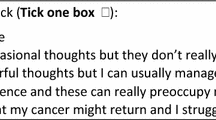Abstract
Long-term survivors of head and neck cancer may suffer from psychological distress and reduced quality of life because of late side-effects of the treatment. In a follow-up study of patients randomised to two different radiation fractionating regimens, 204 patients filled in a mailed questionnaire 7-11 years after treatment. The questionnaire consisted of the General Health Questionnaire, 20-item version (GHQ-20), and the EORTC Core Quality of Life Questionnaire (EORTC QLQ-C30). There were no differences in psychological distress between patients receiving conventional radiotherapy and those receiving a slightly hypofractionated regimen. A high prevalence of psychological distress was found in both treatment groups (30% of 'cases' according to the GHQ-20), especially in patients with impaired cognitive or social function, or with pain. Clinicians need to be aware of this morbidity, and their ability to detect patients with psychological problems needs to be improved. The GHQ-20 can facilitate the communication process in a clinical setting. With an increased awareness of these problems and by using valid instruments for identification of patients at risk, the clinicians may intervene and help the patients to reduce their psychological distress.
Similar content being viewed by others
Author information
Authors and Affiliations
Rights and permissions
About this article
Cite this article
Bjordal, K., Kaasa, S. Psychological distress in head and neck cancer patients 7-11 years after curative treatment. Br J Cancer 71, 592–597 (1995). https://doi.org/10.1038/bjc.1995.115
Issue Date:
DOI: https://doi.org/10.1038/bjc.1995.115
- Springer Nature Limited
This article is cited by
-
Assessment of Shame and Stigma in Head and Neck Cancer: A Meta-Analysis
Journal of Maxillofacial and Oral Surgery (2024)
-
Shame and Stigma Over Long-Term Survival in Postoperative Cases of Head and Neck Cancer
Journal of Maxillofacial and Oral Surgery (2023)
-
Translation and Validation of Shame and Stigma Scale for Head and Neck Cancer into the Hindi Language
Journal of Maxillofacial and Oral Surgery (2021)
-
Radiotherapy-related quality of life in patients with head and neck cancers: a meta-analysis
Supportive Care in Cancer (2020)
-
Adverse Cochlear Effects After Head and Neck Cancer Therapy
Indian Journal of Otolaryngology and Head & Neck Surgery (2019)




